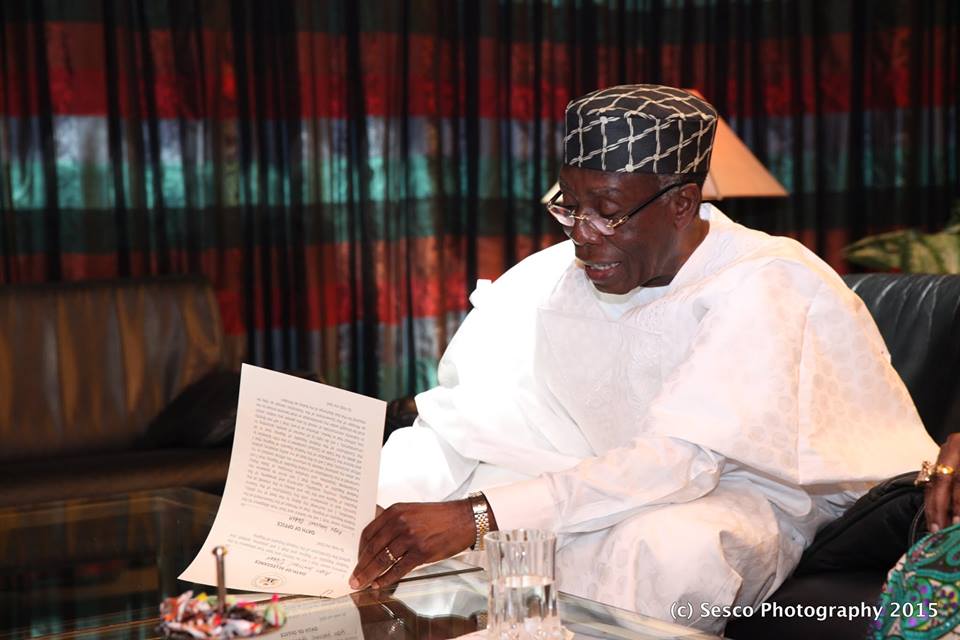Minister of Agriculture, Audu Ogbeh
Anytime I hear Nigerian presidents, ministers, governors, economists, analysts and commentators declare that agriculture is the alternative to oil, and that the solution to Nigeria’s economic woes is to return to the farm, I am tempted to jump up and ask at full volume: “Who agriculture alone don epp?” Some states have hilariously declared work-free days for civil servants to go to the farm. It would be nice to see those farms and how well the emergency farmers are doing. We’ve been told again and again that agriculture, as Nigeria’s biggest employer of labour, is the magic solution to unemployment, that we will export agricultural produce and earn plenty forex. Well done.
I’ve been hearing this fairy-tale all my life. When I was a primary school kid, Lt. Gen. Olusegun Obasanjo, then head of state, asked Nigerians to tighten their belts because the oil boom would not last forever. He added drama by tightening his military belt on TV. He launched Operation Feed the Nation. My grandfather responded by setting up a garden in our backyard. President Shehu Shagari did Green Revolution. The structural adjustment programme (SAP) of Gen. Ibrahim Babangida was basically about diversifying into agriculture. In different shapes, forms, sizes and packaging, we have been talking about agriculture, agriculture and agriculture forever.
Since we love glamorising our exploits in the export of cocoa, coffee, palm oil and groundnuts before the oil boom doom, I will pick on just cocoa to dispel this ill-conceived notion and never-ending campaign that agriculture is the magic wand. We used to be the biggest producers of cocoa in the world. Chief Obafemi Awolowo utilised cocoa revenue to develop the south-west when he was premier of the region in the 1950s. But we dropped the ball along the line and Cote d’Ivoire overtook us. And now we are lamenting that we are nowhere to be found. The solution, therefore, is for the south-west to revive the cocoa farms. Oh, the good old days!
Okay, let us talk about Cote d’Ivoire’s fabled cocoa wealth. Cote d’Ivoire produces 33% of world cocoa and exports to manufacturers such as Hershey’s, Mars Inc. (both in the US) and Nestlé (Switzerland). You know what Cote d’Ivoire earns yearly from exporting raw cocoa? A whopping $2.5bn. I repeat: a whopping $2.5bn! So Mars buys Ivorien cocoa and makes several products from it: Bounty, M&M, Mars and Milky Way, to name a few. You know Mars’ net income from chocolate products alone in 2015? According to the International Cocoa Organisation (ICCO), Mars made a pathetic $18bn, compared to Cote d’Ivoire’s whopping $2.5bn. Agriculture, indeed.
Advertisement
If you are wondering how just one company, which manufactures chocolate, can earn seven times more than a whole country, which farms and exports the cocoa input, then you are asking the same question with me: Who agriculture alone don epp? On ICCO’s list of the world’s top 10 companies in net revenue from chocolate, you have three from America, two from Japan, two from Switzerland, and one each from Luxemburg/Italy, Argentina and Turkey. None from Cote d’Ivoire, Ghana and Indonesia — the world’s three biggest producers of raw cocoa. There must be something that Hershey’s, Mars and Nestlé know that we don’t know as we keep planting cocoa.
To be fair, Cote d’Ivoire is waking up. In 2015, French chocolatier Cémoi opened a plant in Abidjan, the economic capital, to produce chocolate. President Alassane Ouattara, on touring the plant, said: “We want to be able to make chocolate for Ivoriens, for Africans and especially West Africans.” Ouattara (pronounced Wa-ta-ra) understands what we still don’t understand here: that agriculture without industry is dead, being alone. How could I buy cocoa worth $1m from you and make chocolate worth $10 million from it — and you think you are smart? If you are smart, you will start making the chocolate yourself and stop romanticising about the “good old days”.
There was a video that went viral sometime ago. CNN’s Richard Quest visited a cocoa farm in Cote d’Ivoire. Come and see poverty written all over the faces of the farmers, who have been told for decades that agriculture is the magic solution to their problems. Quest gave the farmers bars of chocolate. They were eating the sweet stuff for the first time in their lives! Compare their lives to those of the executives of Mars Inc., who buy the cocoa beans from Cote d’Ivoire. They are flying private jets and holidaying in the moon, while the Ivorien farmers are fighting off flies and bees in the bushes of Koffikro. For your information, Mars Inc. has no cocoa farms!
Advertisement
Don’t get me wrong please. If I have created the impression that agriculture is useless, I do apologise. That is not my intention. After all, agriculture is our culture. Millions of Nigerians are farming rice, beans, cassava and corn. That is huge employment. Also, we certainly can produce many food items that we are importing and burning precious forex on. But is that why governors are declaring work-free days for civil servants to go and plant melon and maize to solve Nigeria’s economic problem and stop the dependency on oil? If only these governors knew that Switzerland does not grow one tree of cocoa, yet makes the world’s most elegant chocolates!
Let us break this whole agric logic into pieces. If we really want to diversify from oil and create proper value, agriculture must give birth to industry. If agriculture currently employs, say, 5 million Nigerians, agro-allied industry can employ 15 million in the value chain. So why do we spend so much time discussing farming and not industry? For example, how many graduates can a tomato farm employ compared to a factory making tomato purée? The factory will employ or engage the services of engineers, technicians, chemists, marketers, accountants, communicators, lawyers, administrators, drivers, and so on. It may even have a sick bay and employ doctors and nurses.
I’m not done. A basket of tomatoes sells for N800 in Kaduna. A 400g tin of purée sells for N300. Look at how many bottles of purée you can get from a basket, and how much value you will be getting. Who, then, is making the real money? The factory will pay company tax, its employees will pay PAYE and the consumers will pay VAT. That is how government will boost its revenue. The purée bottle makers offer a different business altogether that employs workers and pays all kinds of taxes too. And if we are good enough, we can begin to export purée to other countries, and earn forex. This is just purée. Think of a thousand agro-allied factories. Think of our huge population.
Sure, agriculture is very important in a primitive economy like ours. But we always miss the bigger picture. One, we need full optimisation of the sector to enhance productivity. A country like the US knows this much better: the percentage of the population engaged in farming is insignificant, but it is so optimised that the output is out of this world. For instance, the US produces enough rice for local consumption, for export, for aid and to dump in the sea to “stabilise” market prices. Two, processing is where you find the massive job opportunities. The agro-industry will yield far more output, more jobs and more economic value than Benue Friday Farming.
Advertisement
These things look so simple and doable, but commonsense is not common. Our agricultural output can be far better in quantity and quality than currently obtains. We can do with better technology, storage, conditioning, packaging and transportation. Most importantly, our brains should focus on how industry can bring out the real value of agriculture and spark off a chain of economic activities that will create millions of good jobs and generate billions of dollars in revenue to investors, employees and government. But we seem excited only about preaching and promoting the export of raw produce, and we feel so smart we think this is the way out of our oil dependency!
But how can we add value when, despite the billions of dollars we have made from oil since 1999, we don’t have the basic infrastructure to inspire an agro-based industrial explosion? Where are the roads? Where are the rails? Where is the electricity? Where is the security? Where is the finance? Yet I can point to uncountable private jets, mansions and customised cars that politicians and their friends have acquired since 1999 with proceeds from the oil boom — while they keep preaching stone-age agriculture to Nigerians. So if your governor joins this craze of declaring work-free days for primitive farming, just ask him politely: Your Excellency, who agriculture alone don epp?
AND FOUR OTHER THINGS…
BUHARI BREATHER
Two powerful voices have risen in defence of President Muhammadu Buhari’s performance in office. Former President Olusegun Obasanjo says Buhari has not disappointed yet and will eventually overcome his challenges. Pastor Tunde Bakare says it is too early in the day to judge Buhari, and that, in any case, pain is part of adjustment. Coming at a time people are queuing up to apologise for campaigning — and voting — for Buhari, these endorsements must mean a lot to the president. Personally, I am of the opinion that even though Buhari acted too late on critical issues for which we are now paying heavily, you cannot conclude he is a failure in just 15 months. Patience.
Advertisement
PDP MELTDOWN
Pardon me as I laugh at the current trouble the PDP is going through. So the courts, DSS and police combined to scuttle the party’s Port Harcourt convention? Haven’t we seen this before? In the days when PDP was in power, even FAAN and NAMA colluded to stop APC governors from flying. I am laughing because all this has confirmed what I have always said: give the Nigerian politician power and he will behave exactly the same way — no matter his party. I can bet that if PDP manages to regain power today, they will do the same thing to APC again. That is why some of us have become so cynical about Nigerian politicians and their principles. Unchangeable.
Advertisement
ARMY HYSTERIA
So the Nigerian army declared Ahmad Salkida, a journalist, wanted for his “access” to Boko Haram commanders? Interesting. TheCable Editor, ‘Fisayo Soyombo, recently spent two months investigating the plight of soldiers injured in the war against terror. He reported that many of them are suffering from post-traumatic stress disorder, while some are direly in need of artificial limbs. In a sane country, Soyombo would be commended and government would act immediately. But what? The Nigerian army issued a statement accusing TheCable of working for terrorists. Looking back, we must now thank God that they didn’t declare Soyombo wanted. Primitive.
Advertisement
PUNCH DRUNK
Nigeria fielded only one boxer at Rio Olympics, right? Dreams die first. When I watched the exploits of Peter Konyegwachie, Jerry Okorodudu and Christopher Ossai at Los Angeles ’84, I felt if Nigeria was ever going to win an Olympic gold medal, it would be in boxing. Although boxers David Izonritie won silver at Barcelona ’92 and Duncan Dokiwari bronze at Atlanta ’96, the truth is that our boxing has been going down. We have so many raw talents but we don’t understand how to harvest and harness them. Potential world champions are busy serving as touts on the streets. Amateur boxing is dead in Nigeria. What we are witnessing is the funeral. RIP.
Advertisement
16 comments








Thank you Mr. KOLAWOLE. I had actually come to the conclusion that I must be missing something. My focus has been the need to add value to whatever raw material we are producing and where we aren’producing the raw material yet, the value add should drive its local production.
Industry can never grow without agriculture,on ourLand it is still main source of the nation wealth.
Industry can grow without agriculture.
Isn’t that exactly one of the lessons you were to have learnt from this article?
The writer asked if Mars chocolate owned any cocoa farms.Has it stopped them from becoming one of the worlds biggest chocolate makers when the raw material for chocolate does not grow in their home country?Does Switzerland have any iron ore?how come they turn $5 worth of iron ore and titanium into $10,000 worth of Swiss watches?Singapore has nothing,not even water,for it imports water from Malaysia,but has developed into an entrepôt,by importing raw produce,adding value,then re exporting same .
So when you say industry cannot develop without agriculture,you clearly don’t get the message.Mind you,no one is saying agriculture is bad,it is good but not a magic wand our govt peaches it to be
something the author has cleverly skirted in his rush to present a fait accompli of an article is the necessity of huge capital for the establishment of value addition infrastructure.
of course the government is interested in value addition. but how many indigenous entrepreneurs can afford the huge capital outlays? how many can a cash strapped government directly fund? these are the issues. however we can pick lie hanging fruit for a start. improve our yields, start using hybrid seeds, focus on pest and disease control, drive down food importation, and turn the focus of our youth away from white collar work to self employment such as crop and livestock production. there is no value addition in frozen chicken or fish, yet we import a bulk of these when we can easily farm them. that is what 4th e government is trying to focus on. so my brethren, agriculture go epp us!
Give us practical example of the huge cost implication you cited that cannot be funded.
In this article, Simon Kolawole is on point. Producing and exporting commodities cannot help us enough. We need to get into the value-chain- from commodity to processing into other finished products. In the value-chain, there will be farmers, factory workers, professional services like legal, consulting services, logistics (transportation, cargo services, etc), accounting services, etc. Within the location of these processing plant, there will still be people offering support services like restaurant, supermarkets, and other services all around the plant location. These firms that are rendering services to the plant and its workers will also pay various taxes and this is in addition to the taxes the processing plant will pay which Simon has mentioned in this article. Then imagine the economic impact if this plant is producing for domestic and export markets.
Nice job done Simon. You sure fleshed out the short-sighted notion of how agriculture alone will improve Nigeria’s ongoing economic wahala. What immediately came to mind for me is how Nigerians are a people of fads and short memory. Your ready examples of OFN, Green revolution etc rang readily to my recollection and my mind couldn’t but recall a local occurrence of another fad in Ibadan about 30 years ago when a particular type of Akara was reported to be a money spinner for anyone who engaged in its production. Akara osu it was called. It didn’t take much for people who’d been established in other ventures not to diversify but abandon their niche for the Akara osu band wagon. A situation that made for the practical lesson of how overproduction results in low prices due to a glott. The Agriculture fad I dare say has found another revival. Now, talking about Ivorian Cocoa production and how the foreign companies that benefit from it over the producers make an overly smashing profit. One has to be mindful that a bigger tussle over the African labor market in this sector is fraught with allegations of Child slavery. Yet the western companies that trade with Ivory coast are not in anyway held liable for complicity. My fear is the direction our own human rights violations wil take if for an exception agriculture epps us.
Very insighting article. Thank you Mr Kolawole. This article can help this generation to avert another industrial glutt that looms through the political over-bloated confidence in none improved agricultural practices that has recently received media blessings as usual.
Agriculture without innovation to meet today’s marketplace challenges will amount to another monumental failure.
If the industrialists can be attracted by Nigerian population, then Nigerians can be self reliant on processed agro-produces while projecting to export to the African continent.
I agree that industrialisation of the agro value chain is critical to the economic recovery of Nigeria. Our government has a major role to play on the creation of the enabling environment.
Can investors be encouraged to come to an economy where industries are closing shops and relocating? Private investors will always be sceptical when risk factors are almost insurmountable. To attract local and foreign investors to this economy, where are the basic infrastructure such as security, electricity, good road, etc? Likewise, where are the stable political climate, sustainable favourable and protective industrial policies, control of imported competitive commodities, continuity in governance, relaxed tax policies, etc? These are salient issues to be settled alongside the campaign for agriculture and processing of agricultural produces.
Both the federal and state government must be sincere in offering supports for the promotion, growing, processing, storage, marketing and exporting of our local agro contents.
The powers of promoting locally produced commodities and the openings of windows of exports are fully rested on the government. The government can kill or make any business to survive, that is just the truth. There is a need to abuse oil dependency and create sustainable revenue earning alternatives.
Article is on point, but there has to be some infrastructure for industry to thrive. I got many ideas read read write-up write-up you clearly mentioned many areas of require ‘more work’ in the Nigerian State. Road, rail, security, policies and above all a nation state with a leader who understands industriliasation a basic aids to trade.
At first glance on the headline, you would probably shred the writer with abuses. After reading through, you’d bless him for exposing the hidden truths.
This is not different from what we do presently with crude oil. People are still thinking in Nigeria.
Your comment..Good write up: agriculture is the basic step, adding value is most important that we neglect at our peril. for in adding value our sustainable development will be achieved. We as individuals have a great role to play
Your comment..Nice write up. agriculture is the basic step, adding value ( industrialization) will give us the much talk about sustainable development. We all have a great role to play to make it happen as individual a mean as private citizen of this Country for if we are counting on government we may not get there in time. Mr. Kolawole, keep giving us good researched write up.
U and dele momodu triggers my brain with ur articles, but am not sure our leaders read this. Its a pity
I just love your writeup. i’m glad i finally find a like mindset to reckon with in this overblown matter on ‘farming saving the day’. They just say things like ‘youths can go into farming instead of finding job’…yimu.. If only Nigerian leaders would look at the big picture, this idea is brilliant for revamping Nig’s economy.
The article and the responses are all fantastic;but what the writer of the article & those who responded do not realize is that “INTELLIGENT & KNOWLEDGEABLE PEOPLE ABOUND WHILE HONEST, TRUTHFUL PEOPLE ARE VERY SCARCE”.To make myself clear,an average secondary school pupil can come up with a very good idea on how to solve our economic woes in a speech or a write up such as this which all of will applaud.The problem is not that we don’t know what to do or how to do it, but the problem is that an average Nigerian is so morally bankrupt,self centered,ethnic and religious bigoted etc. All the these vices are so embedded in us till they become part of our culture,we call it “THE NIGERIAN FACTOR”.NIGERIA has been bless by God and does’t have any problem except Nigerian. Over 95% of Nigerians today are rebellious to Nigeria.The only solution to Nigeria problem is that anybody who want Nigeria to change is to forget about Nigeria and focus on himself. Let that person change himself to the type he will like our politicians ,our police force,our judiciary,our military,religious leaders,civil servant,business men,artisans etc to be. let me quote Mahatma Gandhi here;he said “Be the change you want” i.e you yourself should be an embodiment of the change we want. Me and you should stop playing lip services and stop rebelling against Nigeria. We should fear the day we will die to meet our creator to give account of our stewardship.
Yes, it is not magic to change in a day, need to work every one for this. Really wonderful article, it has a value for the society. it considerable, helping and worthy.